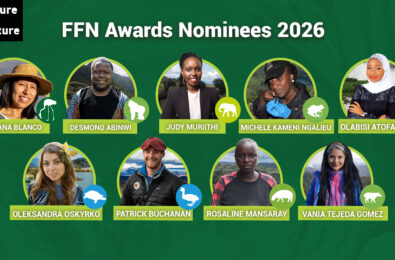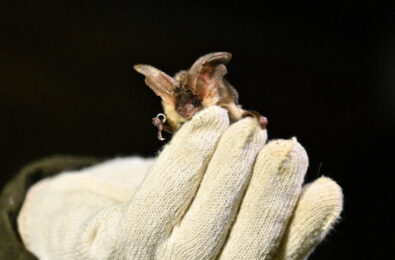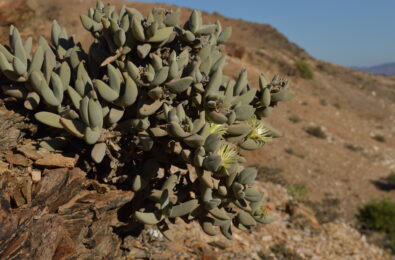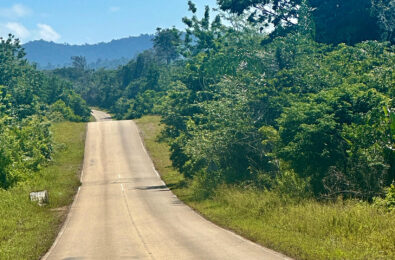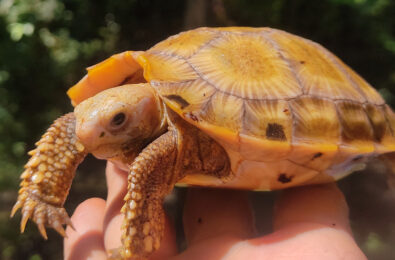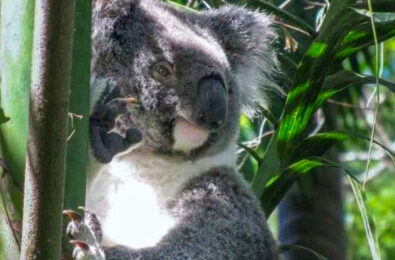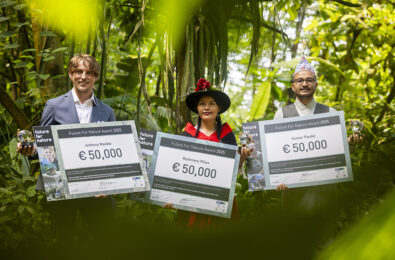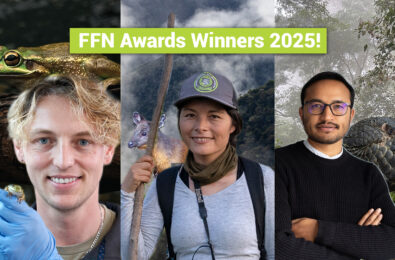Announcing the 2025 Future For Nature Awards Nominees
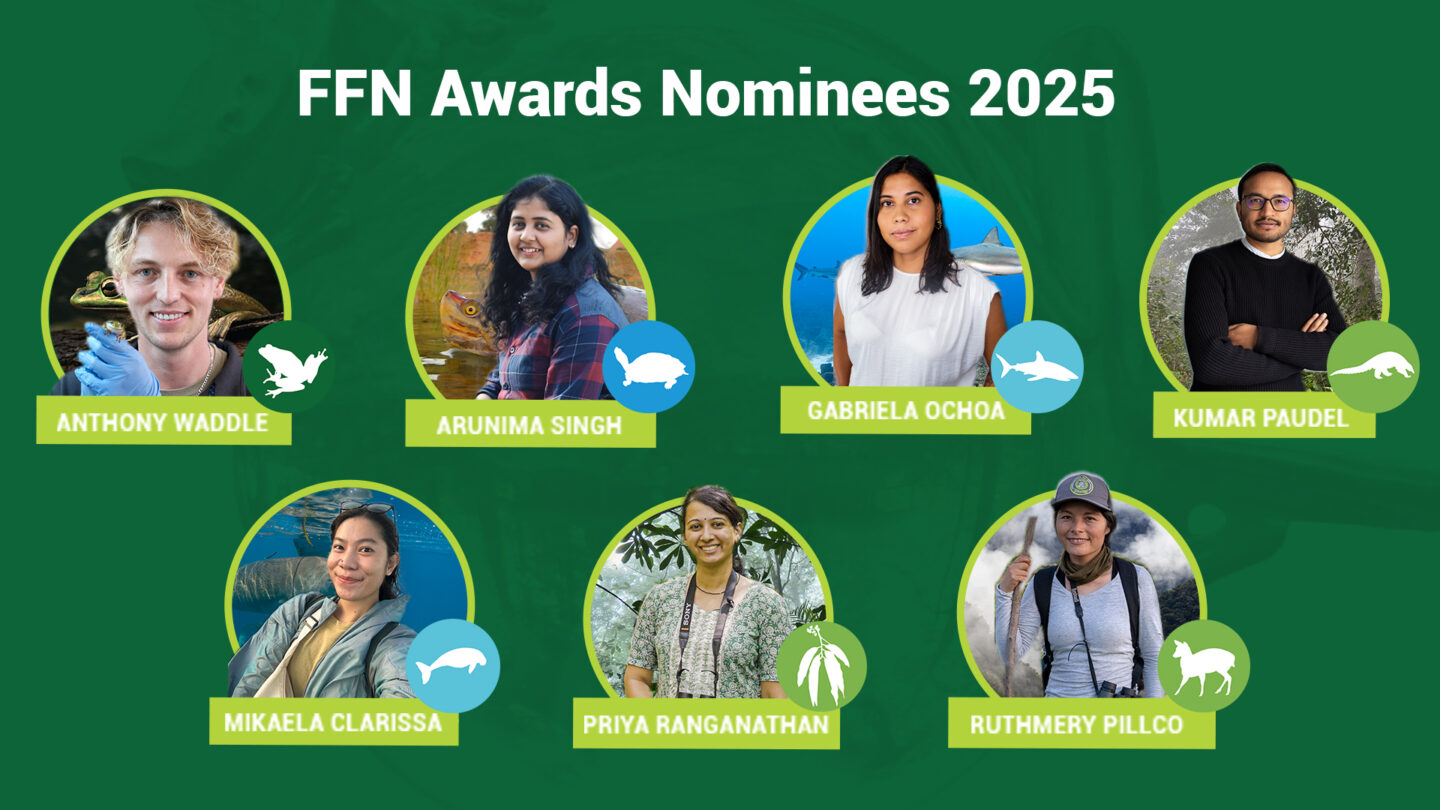
Our National Selection Committee has selected the 2025 Future For Nature Awards nominees. We proudly introduce the seven nominees and their inspiring conservation work:
Anthony Waddle protects green and golden bell frogs in Australia.
Arunima Singh conserving tortoises and freshwater turtles in India.
Gabriela Ochoa protects sharks and rays in Honduras.
Kumar Paudel is dedicated to safeguarding pangolins in Nepal.
Mikaela Clarissa focuses on dugongs conservation in Indonesia.
Priya Ranganathan is working to restore the Myristica swamps in India.
Ruthmery Pillco protects cloud forests in southern Peru.

Anthony Waddle
The Chytrid fungus, an infectious pathogen spreading across amphibians, has had a devastating effect on these animals, greatly reducing the populations of over 500 species, and having driven 90 more to extinction. Faced with a threat of such magnitude, Anthony Waddle work is dedicated to conserving species affected by Chytrid, focusing on safeguarding the Australian green and golden bell frogs, endangered by the pathogen. In his work, Anthony developed a structure called a ‘frog sauna’: an artificial thermal shelter where frogs can heat up during winter chytrid epidemics, recover, and gain resistance to future infections. Alongside working on improving the conservation methods, he also focuses on stakeholder engagement, working together with government agencies, community groups, and citizen scientists through initiatives such as citizen monitoring of frog populations, and widespread building of ‘frog saunas’, all towards ensuring that the endangered species can combat the chytrid threat and thrive again.
The 2025 FFN award would play a vital role in upscaling Anthony’s conservation efforts, expanding them to other species, while also driving the delivery of vaccination and frog saunas across the east coast of Australia. His work has managed to have a positive effect already thanks to a dedicated network of citizens and researchers, despite the limited funds available. The support and awareness that can come with the FFN award will help to enhance this stakeholder network and will be used to magnify both the rate of progress and the impact of his conservation efforts.

Arunima Singh
The fertile Gangetic Plains, in Northern India, are home to vast numbers of tortoises and freshwater turtles (TFTs), with over half of India’s turtle species residing there. But the area has also been a hub for illegal trade, with at least 200 turtles being poached and traded every week. For over a decade, Arunima Singh has dedicated her work to combating the trafficking of TFTs through a multitude of approaches. A big part of her work focuses on engaging with local stakeholders, with Arunima having personally trained over 2,500 enforcement personnel in trade prone zones, forming a ‘Turtle Brigade’ that has been instrumental in saving over 41,000 turtles thus far. Arunima engages with local communities, such as the Kanjars, who resort to illegal trade due to lack of options, to create other opportunities for their members. Her work focuses on fostering competencies and capacity-building including educational and training initiatives with schools and local authorities.
For Arunima, winning the 2025 FFN Award will boost the project’s efforts, supporting many species including seven endangered ones and two facing a high risk of extinction. The funds will go towards helping reduce illegal trafficking of some of the most heavily impacted species. This will be done by enhancing enforcing capacity, through the development of further training and the use of citizen science for strengthening the network. Additionally, the funds will go towards introducing conservation modules in school and expanding outreach efforts. Lastly, but importantly, the resources will support the implementation of more skill development initiatives that will support the Kanjars in creating livelihood options alternative to poaching.

Gabriela Ochoa
Across the coast of Honduras, sharks have coexisted with the indigenous people, with the former frequenting these waters as their home, and the latter building their lives around shark fishing. But with sharks and rays heavily threatened across the world, Honduras was made a shark sanctuary in 2011, a change which conflicts with the way of life of the indigenous people and threatening their livelihood. Despite the legislation being amended in 2016, problems and conflicts still persist. Gabriela Ochoa, who’s been making an impact on ocean conservation with a focus on sharks and their habitat over the past 10 years, is striving to resolve these conflicts in her current work. Through ‘Ilili’ a Honduran–led organization focusing on marine conservation, which she has founded in 2016, Gabriela collaborates with the Miskito indigenous artisanal fishers and the fisheries department towards sustainable fishing practices and inclusive regulations. The organisation has reached over 2000 people in the region, having built a strong network with the Fisheries Department, local shark fisheries, and the indigenous Miskito communities of the region. Ilili is working on mediating the relationship between these stakeholders, building scientific capacity in all of them, and implementing education and awareness initiatives promoting not only conservation goals, but also indigenous culture.
The FFN award would accelerate the reach and effectiveness of the mission, by strengthening community, outreach, and research. It would expand community monitoring and strengthen capacities amongst Miskito fishers, while also supporting the development of educational material in the Miskito language. It would also be used toward identifying and protecting habitats for critically endangered species. Lastly, the funds would support the co-creation of a national plan for sharks, and a revision of current legislation.
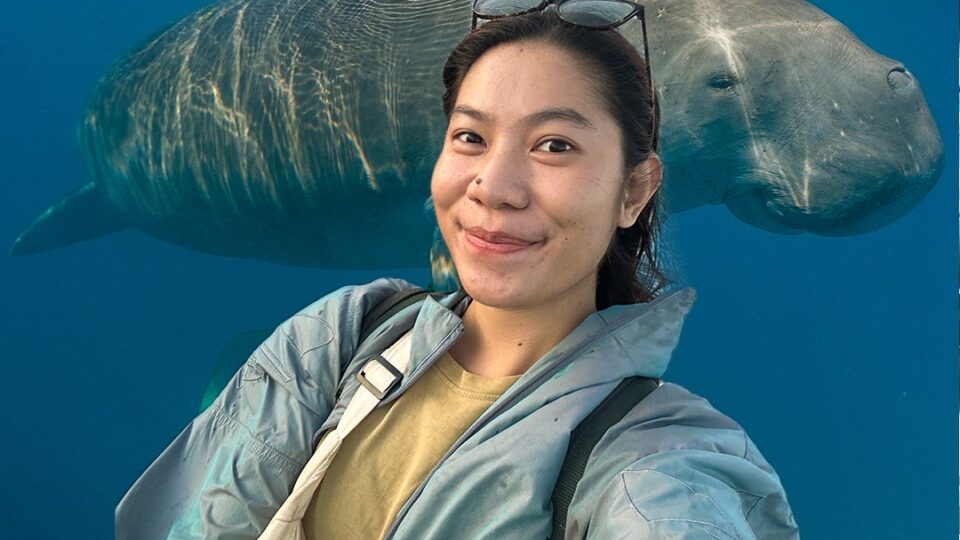
Mikaela Clarissa
The waters around the island of Pantar in the Alor archipelago in Indonesia are home to six healthy species of seagrass, with five of them being a regular food source for the local population of dugong – a protected species. However, poverty and lack of alternatives in the local villages, combined with an apathetic attitude towards conservation, has led to unsustainable fishing practices, threatening the dugong population, and consequently the seagrass species which play a vital environmental role, and which are already facing significant threats to the health of their populations. Mikaela Clarissa is leading Tamang Dugong Indonesia, with the aim to address this challenge through a combination of education, research, and outreach. Mikaela and her team conduct seagrass surveys and dugong sightings, engage with local fishers’ and seaweed farmers, and run the education programme ‘Dugong Sails to School’, where they promote environmental awareness in primary schools. The goal is to raise awareness and add to the local economy through conservation-based initiatives so that both the local population’s prosperity, and the dugong survival, are safeguarded.
The funds from the 2025 FFN Award would go towards strategic planning for conservation and the implementation of sustainable fishing gears in the local population. It would also help continue the Dugong Sails to School programme and expand initiatives to advance sustainable marine resource use. The resources will help with promoting local food processing techniques that can boost nutrition, while at the same time collaborating with organisation to offer training and support towards fostering an alternative, eco-tourism industry. Together, these initiatives can help mitigate the local reliance on Dugong fishing. Lastly, the award would help with providing opportunities for involvement of the local youth, which is generally faced with limited opportunities to engage with species conservation.

Kumar Paudel
In the mountain slopes of Nepal live two species of pangolins that frequently interact with the residents of these areas. But their endangered populations are under constant threat from poachers who hunt and traffic them for their meat and scales, sold in Chinese markets. In his conservation efforts, Kumar Paudel aims to address these threats, having founded the conservation organisation Greehood Nepal, focusing on threatened but overlooked species like the pangolins – their flagship species. In his earlier work, he worked on understanding the motivation of wildlife criminals and using the insights to strengthen anti-poaching and anti-trafficking efforts, reaching millions. Since then, he established the yearly Pangolin Roundtable which has engaged over 400 decision makers over 10 years across the country, while he has also trained over 1000 enforcement officials to counter-wildlife trade efforts. In his current work, Kumar has launched the first pilot pangolin survey in Chitwan National Park, followed by the use of cameras and citizen scientists to record sightings of pangolins, numbering over 100 so far. Lastly, the findings were also used to engage over 600 local indigenous communities, largely unaware of the pangolins’ protected status, in behaviour change towards curbing local bushmeat consumption.
Winning the 2025 FFN Award would help sustain and broaden the current conservation efforts. It would support the expansion of the conservation programme beyond the piloting sites, while also helping the development of an awareness campaign aimed at local communities, educational material on pangolin conservation. The resources would also go towards strengthening anti-poaching units and technology, support the integration of pangolin conservation in established programmes, and continue the Nepal Pangolin Roundtable.
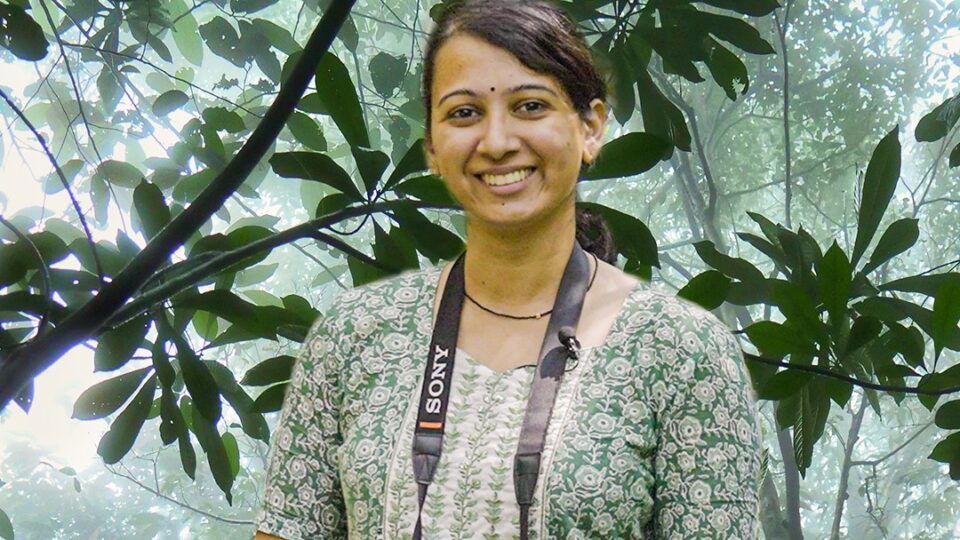
Priya Ranganathan
The Myristica swamps in river valleys of the Western Ghats in India are home to numerous species of flora and fauna, depending on each other in a delicate balance underneath the canopy of trees such as Myristica fatua (MF) and Gymnacranthera canarica (GC). But the swamps are facing severe threats due to both climate change and human activity, which lead to MF and GC being officially classified as Endangered and Vunerable species, respectively. Alarmed by this danger, and the failure of past restoration efforts, Priya Ranganathan has taken action to safeguard the survival of these species, and the ecosystem they help sustain. She worked on mapping the – often inaccessible – swamps and the presence of MF and GC, while also engaging with the local population to draw from their knowledge and understand their attitudes about the threats, and towards the conservation of the swamps. She is currently working on assessing the conditions needed to plant new MF and GC seeds that can grow into healthy trees, with the goal of formulating a plan for the conservation, restoration, and prosperity of the Myristica swamps.
Winning the 2025 FFN award will boost the scope and effectiveness of her current research and restoration efforts. The resources will go towards necessary equipment that will improve the monitoring of the swamp conditions, including water and soil quality, allowing her to better understand what is needed for new seeds to survive and grow into healthy trees in the best way possible. On top of that, the award will help scale up the restoration efforts in that area, as well as go towards community-based restoration efforts, engaging with local schools through workshops, providing village training on ecosystem monitoring, plantation activities with local stakeholders, and the publication of a book on the Myristica swamps.
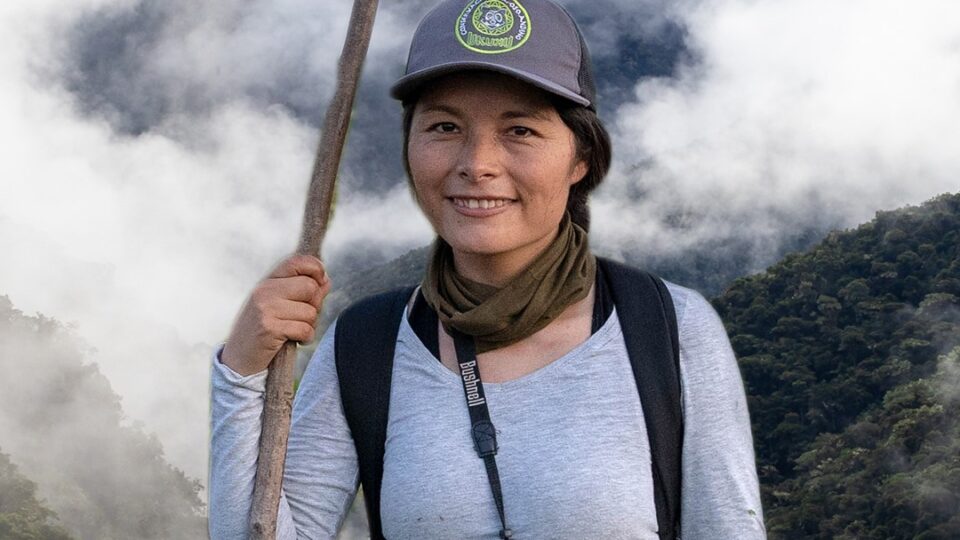
Ruthmery Pillco Huarcaya
The dwarf deer lives in cloud forest areas in the high Andes in southern Peru. Because they often live close to communities, conflicts with humans pose a threat to the dwarf deer, as does the fragmentation of their habitat. For her latest project, Ruthmery Pillco Huarcaya focuses on the elusive and rare dwarf deer Mazama chunyi. Ruthmery is an indigenous Peruvian who grew up in the Andes and chose to become a biologist. She is the founder of the Peruvian Wildlife Foundation and leads the Andean bear conservation programme in Manu National Park. In her conservation work, Ruthmery first wants to focus on filling gaps in knowledge about the ecology and threats of the dwarf deer. This will require extensive field research. Moreover, this research would complement the Andean bear conservation programme, creating synergistic effects and strengthening overall conservation efforts.
Winning the 2025 FFN Award will enable Ruthmery to fill the knowledge gaps regarding the dwarf deer’s ecology and threats. By procuring equipment such as GPS collars and camera traps, the dwarf deer’s movements, home range and behaviour can be accurately tracked and monitored as well as molecular analysis for genetic population analysis. Another wish is to expand the research team with a local field guide, who can be trained to enhance data collection and to promote local expertise in conservation.






